A US civility crisis: Total political war
- Published
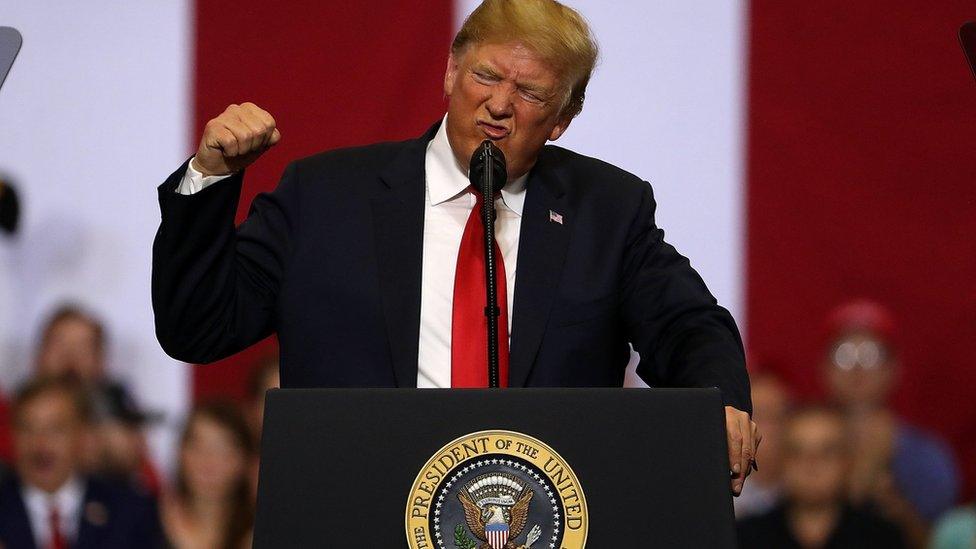
Interrupted dinners, driveway confrontations, threatening leaflets. Donald Trump administration officials are increasingly facing harassment from liberals enraged by the president's words and actions.
Is it a reflection of an increasingly acrimonious political environment, a sign that liberals are spinning out of control or a reasonable response by citizens faced with what some see as a historic national crisis and a president who critics say likes to stoke the fires of discord? It depends on who you ask and - in an increasing fractured US society - their partisan proclivities.
The recent round of actions and reactions, accusations and recriminations, began last week when a group protesting against the administration's policy of separating undocumented migrant families at the border forced Homeland Security Secretary Kirstjen Nielsen to cut short a dinner in a Washington Mexican restaurant.
There have been protests since the start of the Trump presidency, of course, but the audio recordings and first-person accounts of crying children and despondent parents have sent a shock of crackling anger through already frayed nerves of those on the left.
Pushing back
A few days after the Nielsen incident, Florida Attorney General Pam Bondi, an early Trump supporter, was chased out of a theatre by activists questioning her support for the administration's immigration and healthcare policies. The same night, in the western Virginia town of Lexington, the owner of an organic restaurant, the Red Hen, asked White House press secretary Sarah Huckabee Sanders to dine somewhere else. Ms Sanders, one of the most visible members of the Trump administration, complied.
Stephanie Wilkinson would later tell the Washington Post that she decided to make the request because she and members of her restaurant staff viewed the Trump administration's policies towards gays, and immigrant families at the border as "inhumane and unethical".
Trump supporters talk family separations and border security
"I'm not a huge fan of confrontation," she said. "This feels like the moment in our democracy when people have to make uncomfortable actions and decisions to uphold their morals."
One of the restaurant's waiters posted about the incident on Facebook, and Ms Sanders responded to media requests for comment with a tweet confirming - and condemning - the incident. The restaurant, the Red Hen, was inundated by a mix of threats and praise, and Ms Sanders reportedly will begin receiving, external US Secret Service security protection.
Democratic congresswoman Maxine Waters, at a rally in California, applauded the restaurant confrontations - and encouraged more protests.
"The American people have put up with this president long enough," she said. "If you see anybody from that Cabinet in a restaurant, in a department store, at a gasoline station, you get out and you create a crowd, and you push back on them!"
'Be careful what you wish for'
On Monday, Mr Trump entered the fray, tweeting about the Red Hen incident and calling into question the restaurant's cleanliness. He also issued what seemed like a thinly veiled warning to Ms Waters, adding that she is an "extraordinarily low IQ person".
"She has just called for harm to supporters, of which there are many, of the Make America Great Again movement," he wrote. "Be careful what you wish for Max!"
Since then, protesters have demonstrated outside the apartment complex of Stephen Miller, a White House adviser considered one of the architects of Mr Trump's immigration policy, handing out "wanted" leaflets, external alluding to the family-separation practice and accusing him of being guilty of kidnapping children, "crimes against humanity", Islamophobia and promoting Nazism and white supremacy.
Pro-immigration activists also shouted at Republican Senate majority leader Mitch McConnell at Georgetown University, before they were confronted by his wife, Trump administration Transportation Secretary Elaine Chao.
By Thursday night, Mr Trump was leaning into the growing political conflagration, saying that the restaurant protesters "really want anarchy" and that his government would ensure "really strong law and order".
It's Mr Trump's style, displayed on the campaign trail and in the White House, to never back down from a fight. A traditional role of the president has been to play mediator, not instigator - a force for civic reconciliation, not confrontation.
This president, however, frequently finds strength in conflict, and he appears to sense that railing against enemies on the left could be a useful way to animate his political base.
A change of tone
In tone and demeanour, the differences between Mr Trump and his predecessor have never seemed greater. In a fundraiser on Thursday night, Barack Obama told Democrats that his party needs to preach hope and unity, external in the forthcoming mid-term congressional election campaigns.
"The majority of the country doesn't want to see a dog-eat-dog world where everybody is angry all the time," he said.
The confrontational nature of the recent protests and restaurant demonstrations has set off a debate, playing out on social media, television airwaves and newspaper opinion pages over whether American discourse is becoming unacceptably coarse. The Daily Beast's Matt Lewis called it the start of an "Uncivil War", external, where the each side of the political divide believes the other is "evil and illegitimate" - and acts accordingly.
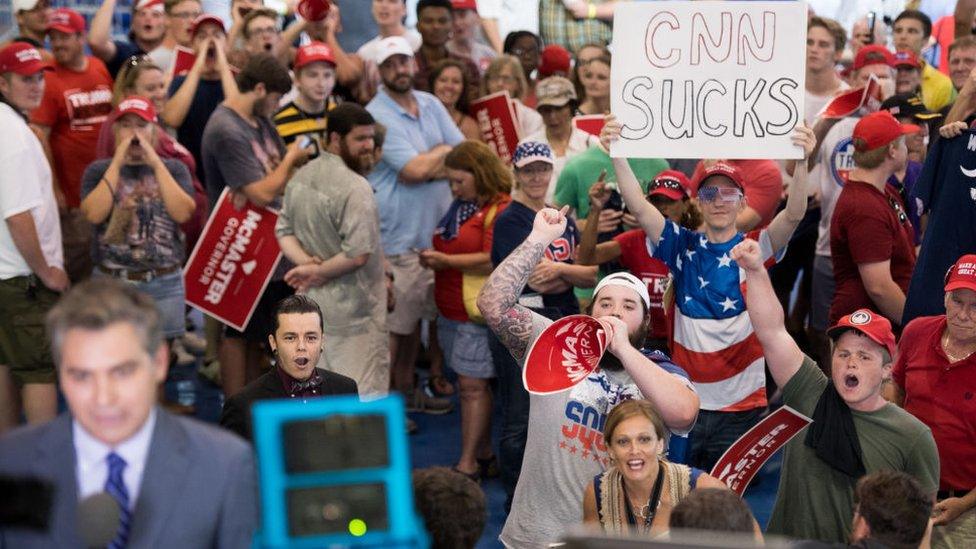
Barbara Perry, director of presidential studies at the University of Virginia's Miller Center, says that while things are bad, the current "level of vitriol" is far from unprecedented. She points to acrimony following the 2000 presidential race, which had to be resolved by the US Supreme Court, Vietnam War protests and civil rights upheaval in the 1960s and, of course, the real Civil War - the one resolved by bullets and cannons - as times when things were worse.
America was founded in revolution and war, she notes, so confrontation and conflict are, in a way, hardwired into the nation's DNA.
"In the 1960s our leaders were being gunned down in the streets or at their political rallies," she says. "Sarah Huckabee Sanders being asked to leave a restaurant, we're going to put that in the same category? No."
Instant conflict
If there's something that's different now, it's the ubiquity of social media and the immediacy that it gives every instance of confrontation and conflict. Where in the past, Perry says, an unpleasant restaurant episode might take days to make it into a newspaper or appear in a political memoir decades later, modern society means within hours the entire nation can be tuned in with outrage or approval.
A November 2017 Marist poll confirmed that more Americans are feeling as though the "overall tone and level of civility" in Washington during the Trump presidency is getting worse (67%) rather than improving (6%). Dive a little deeper, however, and the partisan finger-pointing is on full display. When asked whether Republicans "cross the line" in terms of attacking the other side, 80% of Democrats say yes. When Republicans are asked about Democrats, fully 87% say their opponents go too far.
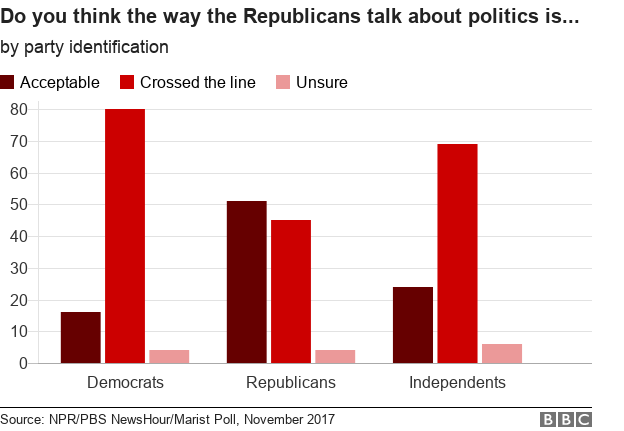
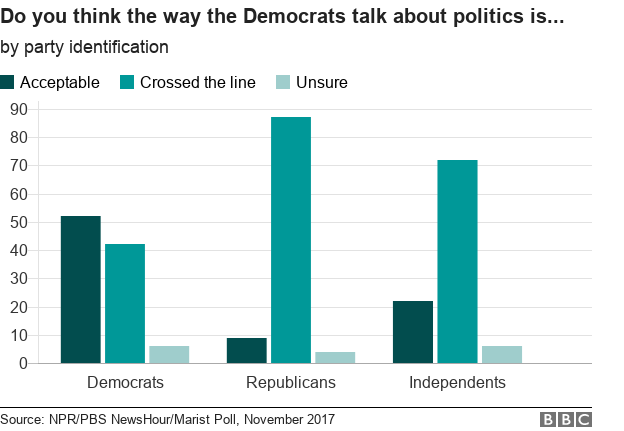
A May CBS/YouGov survey may offer some hints about Mr Trump's appeal, with 78% of Republicans in battleground congressional districts saying they "mostly like" how Mr Trump upsets the "elites and the establishment".
Playing nice?
If confrontation is Mr Trump's brand, at least among Republicans it's a winning tactic.
But do Democrats want that to be their brand, too? Within liberal ranks, a subsidiary debate is taking place over whether the strategy of aggressive confrontation is appropriate or a step too far, a needed escalation or a counterproductive effort.
"Hard to understand this argument that tossing [Ms Sanders] is somehow 'doing something' that will help elect Democrats, defeat Trump or change policy," tweets former Obama strategist, external David Axelrod. "It won't."
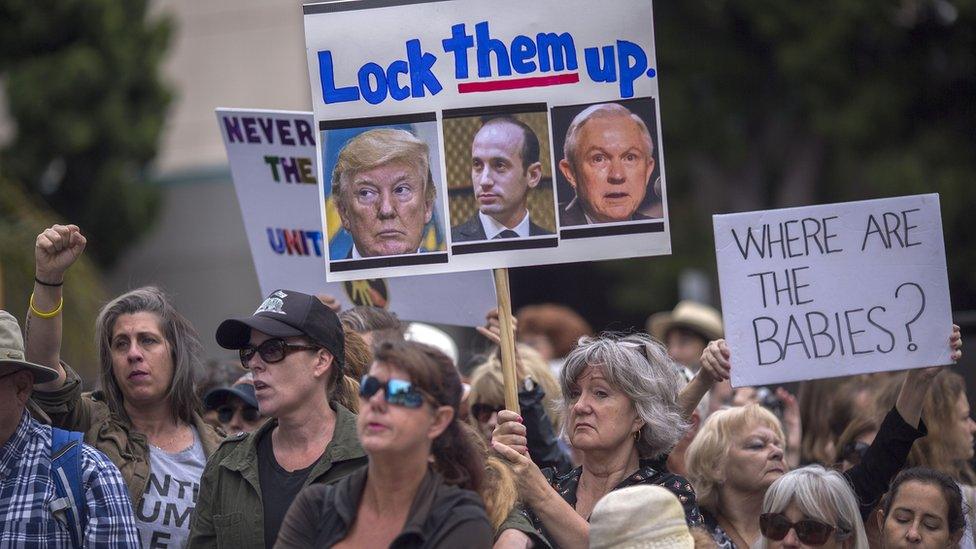
He calls it a "total political gift" to Mr Trump.
Others groused at what they saw as a double standard being applied to the political left.
"The one-sided nature of the 'civility' debate - where only liberals are lectured about this, while Trump mocks disabled people and Gold Star families, but liberals are told to play nice - reminds me, as usual, of the dynamics of abuse," tweets Salon politics writer, external Amanda Marcotte.
Total war
On Thursday afternoon, a man walked into an Annapolis, Maryland, newspaper office and killed five journalists. Although local police report the suspect had a long-running grudge with the publication, it wasn't long before that tragic event, too, was subsumed by political recriminations and accusations that opponents had created an environment for the violence.
Many on the left pointed out that Mr Trump had repeatedly called journalists "enemies of the American people". Fox's Sean Hannity said Ms Waters' comments created a political atmosphere where such violence was more likely.
In World War II, military conflict expanded into "total war", external - where entire nations and peoples were mobilised and consumed in the flames of battle. There was no escape from the carnage.
What US society now may be experiencing is total political war, where - thanks to media and technology - partisan discord is inescapable, whether in the corridors of power in Washington and theatres in Florida, the border with Mexico or restaurants in rural Virginia.
